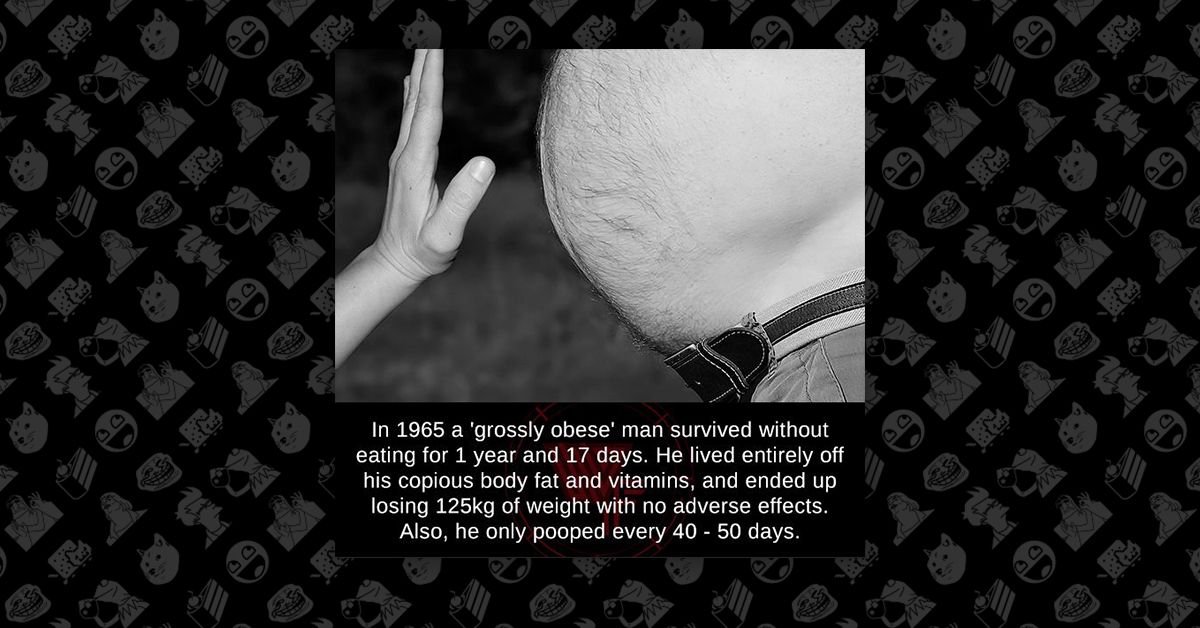A popular story immortalized in the “weird fact" genre of memes concerns a Scottish man (given the identity “Mr. A.B.” by researchers) who fasted for one year and 17 days, successfully losing 276 pounds in the process. A popular online summary of this feat, taken from “Weird Facts”, reads as follows:
In 1965 a 'grossly obese' man survived without eating for 1 year and 17 days. He lived entirely off his copious body fat and vitamins, and ended up losing 125kg [276 lb] of weight with no adverse effects. Also, he only pooped every 40 - 50 days
Surprisingly, this is essentially an accurate statement of fact. A 1973 case report described Mr. A.B.’s dramatic (and Guinness Book of World Records-worthy) effort to lose weight through starvation:
Several years ago a grossly obese young man presented himself for treatment. Initially, there was no intention of making his fast a protracted one, but since he adapted so well and was eager to reach his 'ideal' weight, his fast was continued into what is presently the longest recorded fast. During the 382 days of the fast, the patient's weight decreased from 456 to 180 lb. Five years after undertaking the fast, Mr. A.B.'s weight remains around 196 lb.
Indeed, even the aside about Mr. A. B.’s highly intermittent bowel movements is factual. According to the case report, “evacuation was ... infrequent, there being 37-48 days between stools.” Mr. A. B.’s case was highlighted by Australian science personality “Dr. Karl” Kruszelnick, who explained in a 2012 post on the Australian Broadcasting Corporation's science website that stored fat can indeed serve to fuel a body in the absence of other food:
Once you stop eating, your body gets its energy from the glucose in your bloodstream and liver, thanks to your last meal. You carry a semipermanent 0.5 to 1 kilogram of solids in your gut. The glucose from this runs out after about eight hours.
Then you start burning up a chemical called glycogen. Glycogen is simply a whole bunch of glucose molecules loosely stuck together. It's stored in your liver and muscles. Glycogen is really easy to break down into the individual glucose molecules from which it was made. You can burn glycogen to get the glucose you need for about another 36 to 48 hours.
After two or three days of fasting ... the majority of your energy comes from breaking down fat. The fat molecules break down into two separate chemicals — glycerol (which can be converted into glucose) and free fatty acids (which can be converted into other chemicals called ketones). Your body, including your brain, can run on this glucose and ketones until you finally run out of fat.
This is not to say that extreme fasting comes without risk. As a treatment for obesity, prolonged fasting was fairly common in the 1960s and 70s, but it fell out of favor after reports of serious complications and sometimes deaths attributed to the practice. More recent research has suggested the practice could be safe in doctor-supervised treatments, assuming the patient meets certain medical criteria beforehand.
Mr. A. B. began his treatment in the hospital, but he completed most of his fast at home, testing his blood glucose and urine regularly. In response to the results of those tests, the doctors occasionally added other non-caloric supplements to his vitamin regime, including potassium supplements and sodium supplements, to correct for deficiencies.
Mr. A. B. has never been identified publicly, though he was thanked by the authors of the case report “for his cheerful co-operation and steadfast application to the task of achieving a normal physique.”

